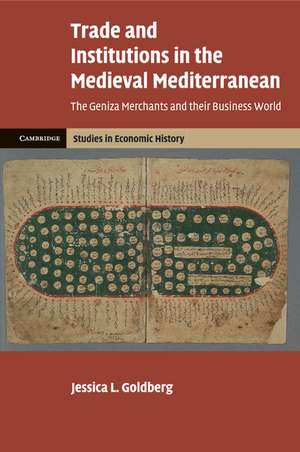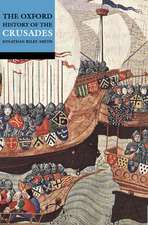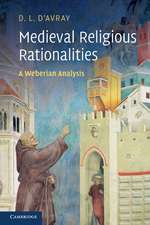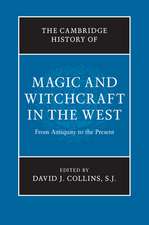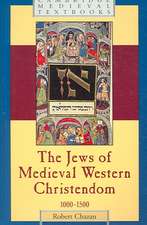Trade and Institutions in the Medieval Mediterranean: The Geniza Merchants and their Business World: Cambridge Studies in Economic History - Second Series
Autor Jessica L. Goldbergen Limba Engleză Paperback – 9 mar 2016
| Toate formatele și edițiile | Preț | Express |
|---|---|---|
| Paperback (1) | 312.84 lei 6-8 săpt. | |
| Cambridge University Press – 9 mar 2016 | 312.84 lei 6-8 săpt. | |
| Hardback (1) | 760.82 lei 6-8 săpt. | |
| Cambridge University Press – 22 aug 2012 | 760.82 lei 6-8 săpt. |
Din seria Cambridge Studies in Economic History - Second Series
-
 Preț: 240.69 lei
Preț: 240.69 lei -
 Preț: 269.82 lei
Preț: 269.82 lei -
 Preț: 236.86 lei
Preț: 236.86 lei -
 Preț: 285.37 lei
Preț: 285.37 lei -
 Preț: 316.69 lei
Preț: 316.69 lei -
 Preț: 193.14 lei
Preț: 193.14 lei -
 Preț: 431.40 lei
Preț: 431.40 lei -
 Preț: 398.32 lei
Preț: 398.32 lei -
 Preț: 370.60 lei
Preț: 370.60 lei -
 Preț: 366.03 lei
Preț: 366.03 lei -
 Preț: 373.32 lei
Preț: 373.32 lei -
 Preț: 348.26 lei
Preț: 348.26 lei -
 Preț: 360.39 lei
Preț: 360.39 lei - 14%
 Preț: 758.86 lei
Preț: 758.86 lei -
 Preț: 284.39 lei
Preț: 284.39 lei -
 Preț: 241.94 lei
Preț: 241.94 lei - 11%
 Preț: 694.23 lei
Preț: 694.23 lei -
 Preț: 237.75 lei
Preț: 237.75 lei -
 Preț: 287.28 lei
Preț: 287.28 lei -
 Preț: 308.60 lei
Preț: 308.60 lei -
 Preț: 206.39 lei
Preț: 206.39 lei - 11%
 Preț: 587.49 lei
Preț: 587.49 lei - 11%
 Preț: 637.54 lei
Preț: 637.54 lei - 9%
 Preț: 593.58 lei
Preț: 593.58 lei
Preț: 312.84 lei
Nou
Puncte Express: 469
Preț estimativ în valută:
59.86€ • 62.51$ • 49.43£
59.86€ • 62.51$ • 49.43£
Carte tipărită la comandă
Livrare economică 15-29 aprilie
Preluare comenzi: 021 569.72.76
Specificații
ISBN-13: 9781107519299
ISBN-10: 1107519292
Pagini: 450
Ilustrații: 13 b/w illus. 22 maps
Dimensiuni: 153 x 230 x 25 mm
Greutate: 0.6 kg
Editura: Cambridge University Press
Colecția Cambridge University Press
Seria Cambridge Studies in Economic History - Second Series
Locul publicării:New York, United States
ISBN-10: 1107519292
Pagini: 450
Ilustrații: 13 b/w illus. 22 maps
Dimensiuni: 153 x 230 x 25 mm
Greutate: 0.6 kg
Editura: Cambridge University Press
Colecția Cambridge University Press
Seria Cambridge Studies in Economic History - Second Series
Locul publicării:New York, United States
Cuprins
1. Introduction: two tales; Part I. Institutions: 2. Merchants in their community; 3. The uses of commercial correspondence; 4. The nature of merchants' trade; 5. The human landscape: business relationships, institutions of law and government; 6. Conclusion to Part I; Part II. Geographies: 7. The geography of information; 8. Commodities in a regional market; 9. Individual geographies of trade; 10. The contracting geography of the eleventh-century merchant network; 11. Conclusion: the Mediterranean through the eyes of Geniza merchants; Glossary of terms; Bibliography.
Recenzii
'Goldberg brilliantly combines a historian's knowledge of detail and an economist's conceptual framework to enrich our understanding of transactions and their governance. She shows how the many-dimensional relationships among traders interact with multiple institutions enforcing property rights and contracts; this brings the research frontier closer to relevance and applicability. Her book is a must-read for researchers and students not only in medieval and economic history, but also in institutional and development economics.' Avinash Dixit, John J. F. Sherrerd '52 University Professor of Economics, Emeritus, Princeton University, New Jersey
'Anyone interested in the history of the Mediterranean and its implications for the development of capitalism will have to read this book. It offers an exacting and innovative reading of a difficult and fascinating trove of records that have generated heated scholarly debates for over a century.' Francesca Trivellato, Yale University, Connecticut
'Succeeds in painting a coherent and compelling picture of a trading community, while still maintaining technical precision. The result is that one learns, and even enters, a world of foreign categories and remarkable social-economic mechanisms.' Joshua Holo, H-Judaic
'Anyone interested in the history of the Mediterranean and its implications for the development of capitalism will have to read this book. It offers an exacting and innovative reading of a difficult and fascinating trove of records that have generated heated scholarly debates for over a century.' Francesca Trivellato, Yale University, Connecticut
'Succeeds in painting a coherent and compelling picture of a trading community, while still maintaining technical precision. The result is that one learns, and even enters, a world of foreign categories and remarkable social-economic mechanisms.' Joshua Holo, H-Judaic
Notă biografică
Descriere
This book reconstructs the business world of the eleventh-century Geniza merchants and, in doing so, rewrites medieval Islamic and Mediterranean economic history.
